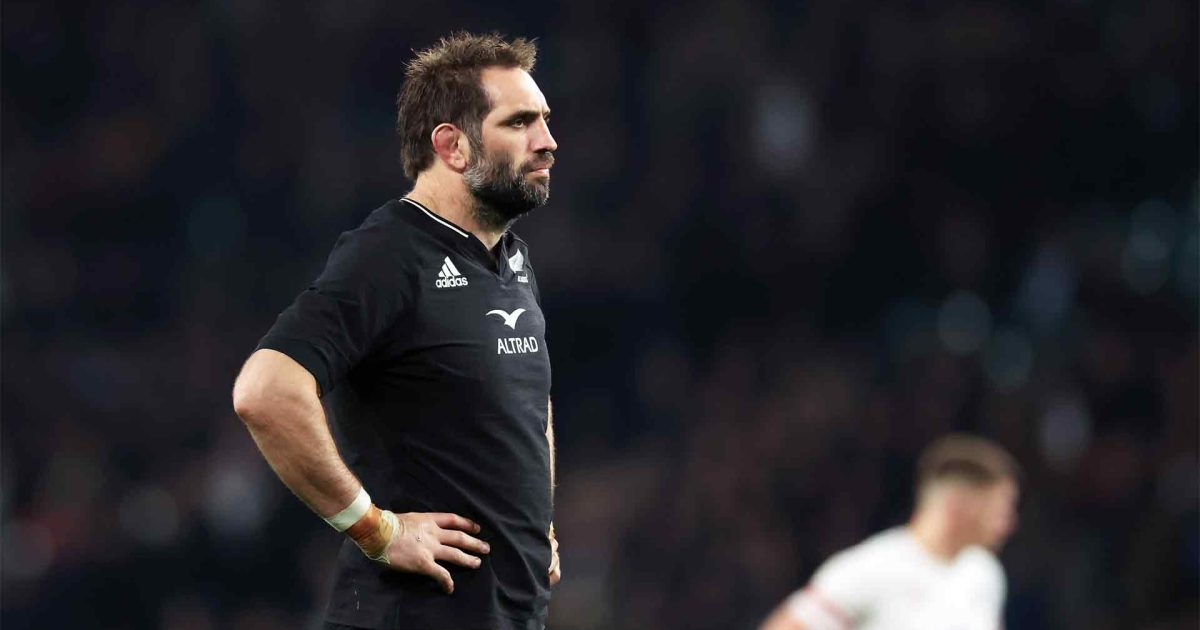Sam Whitelock va égaler la longévité de Richie McCaw

Contre la Namibie au Stadium de Toulouse le vendredi 15 septembre, le deuxième ligne Sam Whitelock, qui fait partie des six joueurs reconduits après la défaite 27-13 en ouverture contre la France, fêtera sa 148e sélection et égalera ainsi Richie McCaw en tant que All Black le plus capé de l’histoire.
Seul Alun Wyn Jones (171) devance les deux Néo-Zélandais au classement des joueurs les plus capés du rugby mondial. Depuis ses débuts en 2010 face à l’Irlande, Whitelock a joué 147 des 173 tests de la Nouvelle-Zélande sur cette période, et a pris part à 120 victoires sur les 143 de son pays au cours des 13 dernières années.
Sam Whitelock a marqué un de ses sept essais en carrière face à la Namibie lors de la RWC 2019. Il est d’ailleurs le seul joueur de son équipe à avoir affronté la Namibie lors des deux précédentes rencontres entre les deux pays. Mais depuis ce match à Tokyo, il n’a franchi la ligne qu’une fois ; face aux Wallabies, l’année dernière à l’Eden Park.
Lui et Brodie Retallick vont ajouter une unité à leur record de matchs joués côte-à-côte en deuxième ligne, avec une 66e association.
En termes de pallier à franchir, Caleb Clarke, qui fêtera sa 19e sélection, n’aura besoin que d’une cape supplémentaire pour égaler son père, Eroni au nombre de sélections avec les All Blacks. Eroni père a inscrit six essais en dix sélections entre 1992 et 1998, mais n’a jamais participé à une Coupe du Monde de Rugby.
Titularisé à l’ouverture pour sa 43e sélection, Damian McKenzie disputera son premier match de Coupe du Monde de Rugby. Il avait dû déclarer forfait pour la précédente édition après avoir subi une blessure au talon d’Achille en Super Rugby. Il sera titulaire pour la cinquième fois à ce poste. Sur 22 de ses 26 titularisations, il a endossé le rôle d’arrière.
Cam Roigard est un des trois joueurs de l’équipe à faire ses débuts en Coupe du Monde. Il partage cette particularité avec Caleb Clarke et Damian McKenzie. Il fête sa première titularisation avec les All Blacks après deux sélections en tant que remplaçant cette année, face aux Wallabies et aux Springboks, au cours desquelles il a joué 40 minutes.
Le capitanat sera de nouveau assuré par Ardie Savea qui est le seul All Black à avoir débuté les six tests de l’année 2023. Jusqu’ici il a disputé tous les matchs en intégralité
XV de départ
1 Ofa Tuungafasi
2 Samisoni Taukei’aho
3 Nepo Laulala
4 Brodie Retallick
5 Samuel Whitelock
6 Luke Jacobson
7 Dalton Papali’i
8 Ardie Savea (cap.)
9 Cam Roigard
10 Damian McKenzie
11 Leicester Fainga’anuku
12 David Havili
13 Anton Lienert-Brown
14 Caleb Clarke
15 Beauden Barrett
Remplaçants
16 Dane Coles
17 Ethan de Groot
18 Fletcher Newell
19 Scott Barrett
20 Tupou Vaa’i
21 Aaron Smith
22 Richie Mo’unga
23 Rieko Ioane











































